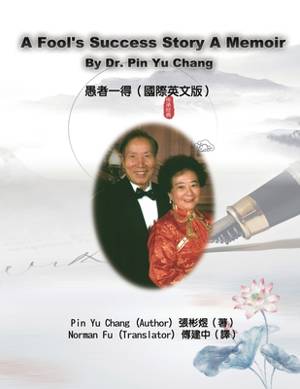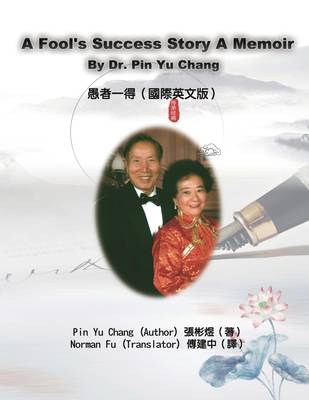
- Afhalen na 1 uur in een winkel met voorraad
- Gratis thuislevering in België vanaf € 30
- Ruim aanbod met 7 miljoen producten
- Afhalen na 1 uur in een winkel met voorraad
- Gratis thuislevering in België vanaf € 30
- Ruim aanbod met 7 miljoen producten
A Fool's Success Story - A Memoir By Dr. Pin Yu Chang
愚者一得(國際英文版)
Pin Yu Chang, 張彬煜Omschrijving
Preface: Dr. P.Y. Chang Always Ahead of Others
Forty years ago, I already heard about the famous P. Y. Chang. At that time I was working and struggling to make a living, but Dr. Chang was already a well-known millionaire in the Washington, D. C. area. People called him millionaire Chang. I was very curious about him. My late wife Rowena Fu and Mrs. Frances Chang were both members of the Tunghsin Choral Society. One time we were invited to his home. That's how I got to know him. I found out that unlike the rich Chinese, who live in mansions and drive expensive cars, they were just like the ordinary Chinese having a simple home and leading a simple life. This whetted my curiosity even more, and my respect for him welled up in my heart.
Chinese intellectuals have the mentality that "all other pursuits are worthless, only the study of books ranks first and foremost." They consider money stinking. As a result, they loathe labor, and live their poor but principled life. They consider themselves high-minded, or they join the bureaucracy and become dependents of the power elites. If they are clean and not corrupt, when they lose their official jobs, they don't have the means to be independent financially. According to Western sinologists, this is the reason why China's intelligentsia has never been a counterbalancing force to the ruling class. P. Y. Chang is different from traditional Chinese intellectuals. He advocates that "if you don't seek fame and profit, you must be mediocre." He also says that "to die of poverty is criminal." He's certainly an avantgarde against traditional thinking. He is the one that introduces this new thinking and brings some fresh air. Hence, when he worked in U. S. agencies and companies, he insisted on his right to have a side line. His advice to the talented men and women: You must know how to manage money and make money. His contrarian way of thinking and behavior demands special attention.
As a matter of fact, the standard by which the Americans judge a person's success or failure is usually his wealth. The way to create wealth in America is by way of one's intelligence and wisdom, billionaires like Bill Gates of Microsoft, Steve Jobs of Apple and Mark Zuckerberg of Facebook are all like that. That's why the Americans attach great importance to intellectual property rights. The Chinese never had such a concept.
When he was 70, his relatives and friends threw a birthday party in his honor. I was invited to make a short speech on that occasion. In my remarks I cited a poem by a famous general and strategist Cao Cao (曹操) of the Eastern Han dynasty. The poem written by Cao Cao in his twilight years reads in part: "Like an old horse transporting a heavy load of timber, my destination is hundreds of miles away." I wished P. Y. Chang just like that horse with a long journey ahead. When it was
P. Y's turn to respond, he quoted the American expression, " I'll go the extra mile for the rest of my life." Chinese and American diction, a perfect union, his witticism showed itself brilliantly and he got a round of applause. I have nothing but admiration for him. To this day, I can't forget that remarkable evening. More than a decade has since passed, P. Y. Chang is still in excellent health, old but vigorous. He has gone not just the extra mile, but thousands of miles. No wonder he is always ahead of others. We look up to him and follow him forever.
Norman Fu, former U. S. Bureau Chief of The China Times
Specificaties
Betrokkenen
- Auteur(s):
- Uitgeverij:
Inhoud
- Aantal bladzijden:
- 142
- Taal:
- Engels
Eigenschappen
- Productcode (EAN):
- 9781647840976
- Verschijningsdatum:
- 20/06/2021
- Uitvoering:
- Paperback
- Formaat:
- Trade paperback (VS)
- Afmetingen:
- 216 mm x 279 mm
- Gewicht:
- 344 g

Alleen bij Standaard Boekhandel
Beoordelingen
We publiceren alleen reviews die voldoen aan de voorwaarden voor reviews. Bekijk onze voorwaarden voor reviews.











